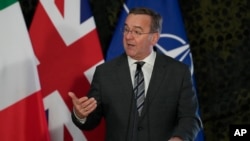Germany, Poland, Britain, France and Italy will implement as swiftly as possible new NATO targets for weapons and troop numbers which the alliance is about to agree upon, German Defense Minister Boris Pistorius pledged on Monday.
The chief of NATO's Military Committee, Dutch Admiral Rob Bauer, told Reuters earlier that the alliance aims to bring forward the decision on new targets for weapons and troop numbers to this summer.
The Western military and political alliance has been under pressure not only in the wake of Russia's 2022 invasion of Ukraine but also internally, with U.S. President-elect Donald Trump calling on its members to spend much more on defense.
A NATO summit in The Hague at the end of June will also discuss hiking NATO's existing military spending target of 2% of national GDP, with 3% being floated by some experts as one potential new target. Trump, who returns to the White House on Jan. 20, recently urged a 5% goal.
Speaking after a meeting with his four counterparts in the Polish village of Nowa Wies, Pistorius welcomed NATO's decision to fix the alliance's new capability targets in June instead of October as originally planned, a move he said was triggered by a German request.
"This buys us a lot of time and we can much earlier kick off the implementation," Pistorius told reporters.
At the same time, he rejected Trump's push to have members raise defense spending to 5% of GDP, arguing this would equal more than 40% of Germany's total budget.
"The crucial question for me is: How fast do we … every single ally, manage to meet NATO's new capability targets? … How quickly are we fully capable of defending ourselves when we need to be?" Pistorius said.
France's defense minister, Sebastien Lecornu, said military budgets would continue to increase but did not specify a figure for a new NATO target.
"The situation is worse than it was during the Cold War. ... We can be defeated without being invaded," he said, referring to cyberattacks.
Polish Defense Minister Wladyslaw Kosiniak-Kamysz said the next meeting of the Group of Five in Paris would discuss how to finance the organization and the development of the arms industry in Europe.
"We will coordinate all defense-related activities between our countries. This is a priority. Europe must show its strength. Europe can again be a beacon for the whole world, it just needs to say clearly: Security is number one," he said.





